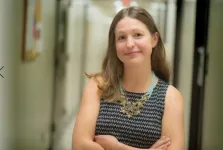(Press-News.org) BIRMINGHAM, Ala. - Clinical evaluation of three COVID-19 vaccine candidates in 2020-21 during a worldwide pandemic that killed or sickened millions was unprecedented in terms of urgency and scope. Responsibility for the safety, integrity and scientific validity of the trials in the United States fell to 12 experts of the federally appointed COVID-19 Vaccine Data and Safety Monitoring Board, or COVID-19 DSMB, who in turn report to an oversight group.
This COVID-19 DSMB team -- which included co-contributing author Richard Whitley, M.D., distinguished professor of pediatrics in the University of Alabama at Birmingham School of Medicine -- has now taken the unusual step of publishing details of their review process in The Journal of Infectious Diseases.
Their goal, they say, is to assure the public of the board's independence and lack of interference from external actors, while they operated under exceptional conditions. Challenges the board faced included:
The remarkable scale and pace of the trials.
The frequency of safety events among a combined enrollment of more than 100,000 people, many of whom were older adults or persons with comorbidities that put them at independent risk of serious health events.
The need to monitor a portfolio of related trials rather than a single trial, and the need to harmonize these studies.
The politicized setting in which the trials have taken place, including a United States presidential election.
Despite these challenges, they say that the COVID-19 Vaccine DSMB also "can serve as a model for future situations in which there is an urgent need for coordinated development of multiple therapeutic or preventive interventions to address rapidly evolving public health threats."
The story began in May 2020, as the federal government launched Operation Warp Speed to accelerate COVID-19 vaccine development. The operation included funding for multiple large randomized trials to assess the safety and efficacy of candidate vaccines and agreements to purchase hundreds of millions of doses to assure timely manufacture of ample quantities of vaccine.
To ensure rigorous, independent and unbiased scientific and ethical oversight of the vaccine field trials, the National Institute of Allergy and Infectious Diseases, or NIAID, empaneled the COVID-19 Vaccine DSMB. The board has 11 members from the United States, Brazil, South Africa and the United Kingdom, including experts in infectious disease, vaccinology, immunology, biostatistics, pharmacoepidemiology, public health and bioethics, as well as a biostatistician, who is a full-time NIAID employee and serves as executive secretary.
The DSMB's Journal of Infectious Diseases article details their study review process as they reviewed three formal interim efficacy analyses of trials for vaccine makers Moderna, Janssen and AstraZeneca. The board currently is monitoring the Moderna, Janssen, AstraZeneca and Novavax trials. The trial of the Pfizer/BioNTech vaccine, which was not federally funded, has a separate DSMB.
The DSMB reports that it has met by videoconference more than 25 times, generally for two to three hours at a time. As needed, the board holds ad hoc meetings to address emerging safety concerns. If accrual or event milestones were met between scheduled meetings, the board met to review interim analyses.
The board focused on trial conduct, safety and vaccine efficacy. This included a close look at accrual of trial participants, including the numbers and proportions of people in relevant subgroups like age, sex, race, ethnicity and people with risk factors that predispose them to severe COVID-19.
"The DSMB's role in overseeing a portfolio of multiple trials," the board writes, "has facilitated its ability to perform safety monitoring across all trials. For example, when concerns first surfaced about thromboembolic events associated with AstraZeneca's vaccine in Europe, the DSMB was able to review relevant categories of adverse events across its portfolio of trials to look for broader patterns associated with SARS-CoV-2 vaccines as a class."
Participant safety was a central responsibility for the board, which devoted much attention at each meeting to review interim safety metrics. Given the large number of participants in the trials, the board also received regular reports of individual adverse safety events between meetings and determined what further information or actions in response might be needed.
Among the political challenges the board faced was what Science magazine called its "extraordinary rebuke" last March, when the board said the company had used potentially misleading and outdated data in its initial analysis.
The highly politicized atmosphere also included an August 2020 tweet by then-President Donald Trump that the United States Food and Drug Administration "deep state" was delaying COVID-19 vaccines, and his September suggestion that a vaccine for COVID-19 could be ready by Election Day. Another political challenge came when then-FDA Director Stephen Hahn said he was prepared to authorize a vaccine before Phase 3 trials were complete.
Yet politics did not affect the board's work. In its report, the COVID-19 Vaccine DSMB concluded that "Operation Warp Speed is an unprecedented effort to develop safe and effective vaccines that will help end the COVID-19 pandemic.
"Conducting clinical trials under these circumstances requires the utmost attention to participant safety and to data integrity, so that the public and the medical community will ultimately have trust in the vaccines and the process used to develop them. Although (the board) operates behind the scenes, by virtue of its access to unblinded interim data, its charge to recommend changes to ongoing studies based on these data, and its ability to examine emerging data across multiple parallel trials, the COVID-19 Vaccine DSMB is uniquely positioned to ensure that these goals are met."
INFORMATION:
Co-authors with corresponding author Steven Joffe, M.D., University of Pennsylvania, and Whitley, of the report "Data and safety monitoring of COVID-19 vaccine clinical trials" are the other board members and the executive secretary. They are Abdel Babiker, University College London, United Kingdom; Susan S. Ellenberg, University of Pennsylvania; Alan Fix, Center for Vaccine Innovation and Access, PATH, Washington, D.C.; Marie R. Griffin, Vanderbilt School of Medicine, Nashville, Tennessee; Sally Hunsberger, NIAID, Rockville, Maryland; Jorge Kalil, Universidade de São Paulo, São Paulo, Brazil; Myron M. Levine, University of Maryland School of Medicine, Baltimore, Maryland; Malegapuru W. Makgoba, Office of Health Standards and Compliance, Pretoria, Republic of South Africa; Reneé H. Moore, Emory University, Atlanta, Georgia; and Anastasios A. Tsiatis, North Carolina State University, Raleigh, North Carolina.
Support for operations of the COVID-19 Vaccine DSMB came from NIAID.
For the first time, researchers have used precariously-balanced rocks to set the formal design earthquake motions for a major existing engineered structure--the Clyde Dam, the largest concrete dam in New Zealand.
Mark Stirling of the University of Otago and colleagues identified and assessed the ages of these gravity-defying rock formations located about 2 kilometers from the dam site, using these data to determine the peak ground accelerations that the rocks could withstand before toppling.
This in turn was used to set the Safety Evaluation Earthquake (SEE) spectrum for the dam, or ...
An underwater archaeologist from The University of Texas at Arlington is part of a research team studying 9,000-year-old stone tool artifacts discovered in Lake Huron that originated from an obsidian quarry more than 2,000 miles away in central Oregon.
The obsidian flakes from the underwater archaeological site represent the oldest and farthest east confirmed specimens of western obsidian ever found in the continental United States.
"In this case, these tiny obsidian artifacts reveal social connections across North America 9,000 years ago," said Ashley Lemke, assistant professor of sociology and anthropology at UT Arlington. "The artifacts found below the Great Lakes come from a geological source in Oregon, 4,000 kilometers away---making it one of the longest distances ...
"So, no one told you life was going to be this way.
Your job's a joke, you're broke, you're love life's DOA.
It's like you're always stuck in second gear,
When it hasn't been your day, your week, your month, or even your year..."
If you have watched TV since the 1990s, the sitcom theme song, "I'll Be There for You," has likely been stuck in your head at one point or another. New research from UC Davis suggests these experiences are more than a passing nuisance -- they play an important role in helping memories form, not only for the song, but also related life events like hanging out with friends ...
When a fictional female journalist appears on screen, chances are she's about to sleep with one of her sources. It's a trope that infuriates actual women in news media -- and it can have real-life consequences, says University of Florida researcher Frank Waddell, Ph.D.
In shows like "House of Cards" and movies like "Thank You for Smoking," female reporters are quick to trade sex for information. Even when sex with sources has nothing to do with ambition -- such as the hookups in "Sharp Objects," "Top Five," "Trainwreck," and the "Gilmore Girls" reboot, to name a few -- it still portrays unethical behavior.
"In the past 20 to 30 years, Hollywood has really latched on to this. ...
A study of media coverage of 623 scientific papers on Alzheimer disease research conducted in mice reveals that the news media are more likely to write a story about alleged breakthroughs or medical research findings if research authors omit mice from their studies' titles. On the other hand, papers that acknowledge mice in their titles result in limited media coverage.
In addition, the study titled "What's not in the news headlines or titles of Alzheimer disease articles? #In mice" conducted by Dr Marcia Triunfol of Humane Society International and Dr Fabio Gouveia of the Oswaldo Cruz Foundation in Brazil, and published in PLoS ...
Discussions of a broken value system are ubiquitous in science, especially after the COVID-19 pandemic served to expose inequality globally. However, according to the authors of an article publishing 15th June 2021 in the open access journal PLOS Biology, science itself is not "broken," but it was built on deeply-entrenched, systemic sexist and racist values, which perpetuate biases through the continued focus on citation rates and impact factors.
The author maintain that while equity within science has advanced thanks to the tireless efforts of generations of systemically marginalized groups, the system remains outdated, colonialist, and patriarchal. ...
Financial toxicity, the financial strain experienced by patients accessing health care, impacts a large population of cancer patients according to prior research. A new study, published in JACC: CardioOncology, finds financial toxicity is often greater among heart disease patients compared to cancer patients, and those with both conditions suffer the highest burden.
"Heart disease and cancer are the leading causes of death in the United States, yet most research on financial toxicity has focused on cancer patients. It is important to consider that cancer patients may have short bursts of high expenditures for treatments, while heart disease patients are often incurring ...
The number of people dying from cardiovascular disease (CVD) in Asia is increasing rapidly, with over half of all CVD deaths globally in 2019 occurring in Asian countries, according to a state-of-the-art review paper published in the inaugural issue of JACC: Asia. The data demonstrates an urgent need to understand the burdens and epidemiological features of CVD in Asian countries to develop localized CVD prevention strategies to combat the epidemic.
From 1990 to 2019, the number of CVD deaths in Asia rose from 5.6 million to 10.8 million. Nearly 39% of these CVD deaths were premature, meaning they occurred in a person less than 70 years old, which was significantly higher than premature CVD deaths in the U.S. (23%). Most ...
There is increasing scrutiny around how science is communicated to the public, but what is the relationship between how scientists report their findings and how media reports it to the public? A study published in PLOS Biology by Marcia Triunfol at Humane Society International, in Washington, DC and Fabio Gouveia at Oswaldo Cruz Foundation in Rio de Janeiro, Brazil suggests that when authors of scientific papers omit the basic fact that a study was conducted in mice (and not in humans) from the article title, journalists reporting on the paper tend to do the same.
Alzheimer's Disease is an exclusively ...
What will the Earth be like for our children and grandchildren, as temperatures continue to rise? We can be fairly certain of some things: Some regions will become inhospitable, as heat drives their inhabitants away or causes massive declines and changes in their ecosystems. Many other physical, chemical and biological processes will also be affected by rising temperatures that threaten critical ecosystem services such as food production, biodiversity and energy security.
But what these changes will be and exactly how they impact the Earth -- and ultimately us humans -- are still difficult to predict. Many of them are so gradual and happen over such a long timescale that they wouldn't be noticeable ...



